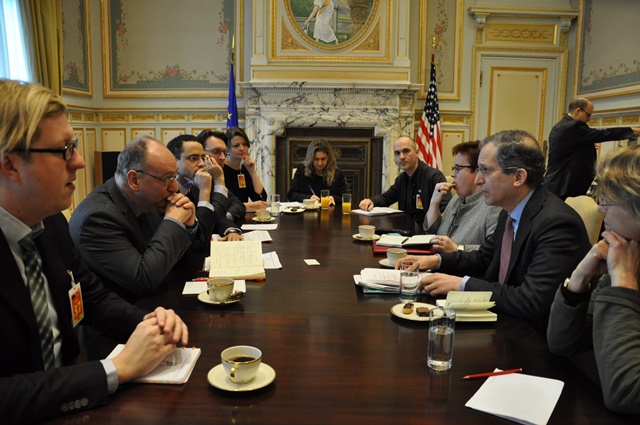US Ambassador meets EU civil society to talk TTIP

Last week [12 February] we participated in an exchange of views on the EU-US trade agreement – the Transatlantic Trade and Investment Partnership (TTIP) – with the US Ambassador to the EU, Anthony L. Gardner. The meeting was organised by our member SOLIDAR, together with fellow Social Platform member the European Public Health Alliance (EPHA), the European Trade Union Confederation (ETUC) and the European Public Services Union (EPSU).
The conversation focused on the possible impacts of TTIP on social, health and education services, on the EU public procurement directive and also the Investor State Dispute Settlement system (read more).
We heard that the US shares the same concerns as us when it comes to protection of labour rights and the environment, as well as concerning the need to increase the level of transparency of TTIP negotiations. The EU and the US both need economic growth. Globalisation is a fact that cannot be denied or ignored; the question is just how to shape it. TTIP provides the opportunity to set global standards between the most powerful world economies, which could in the future be extended to other parts of the world such as China and Brazil.
From the open discussion we had concerning our position calling for a broad exclusion of public services (please see our previous article), it emerged that we have different traditions and understanding of the welfare state. For example, we do not agree that competition necessarily leads to better services. In Europe, we have seen that competition between service providers has generally focused on decreasing service costs, with sometimes detrimental effect on their quality, rather than on increasing the quality dimension.
We also raised that by opening up competition with businesses from the US, there is a risk that businesses will tend to invest only in urban and wealthy areas and to target the most profitable target groups, leaving responsibility for users with complex needs to public authorities and NGOs. We warned that TTIP should not exacerbate the creation of a dual system of public service provision, which is already happening in Europe, being an additional source of growing inequalities in our societies.
The exchange of views allowed a better understanding of the different positions, and we hope that this good exercise can be repeated in the future.













































